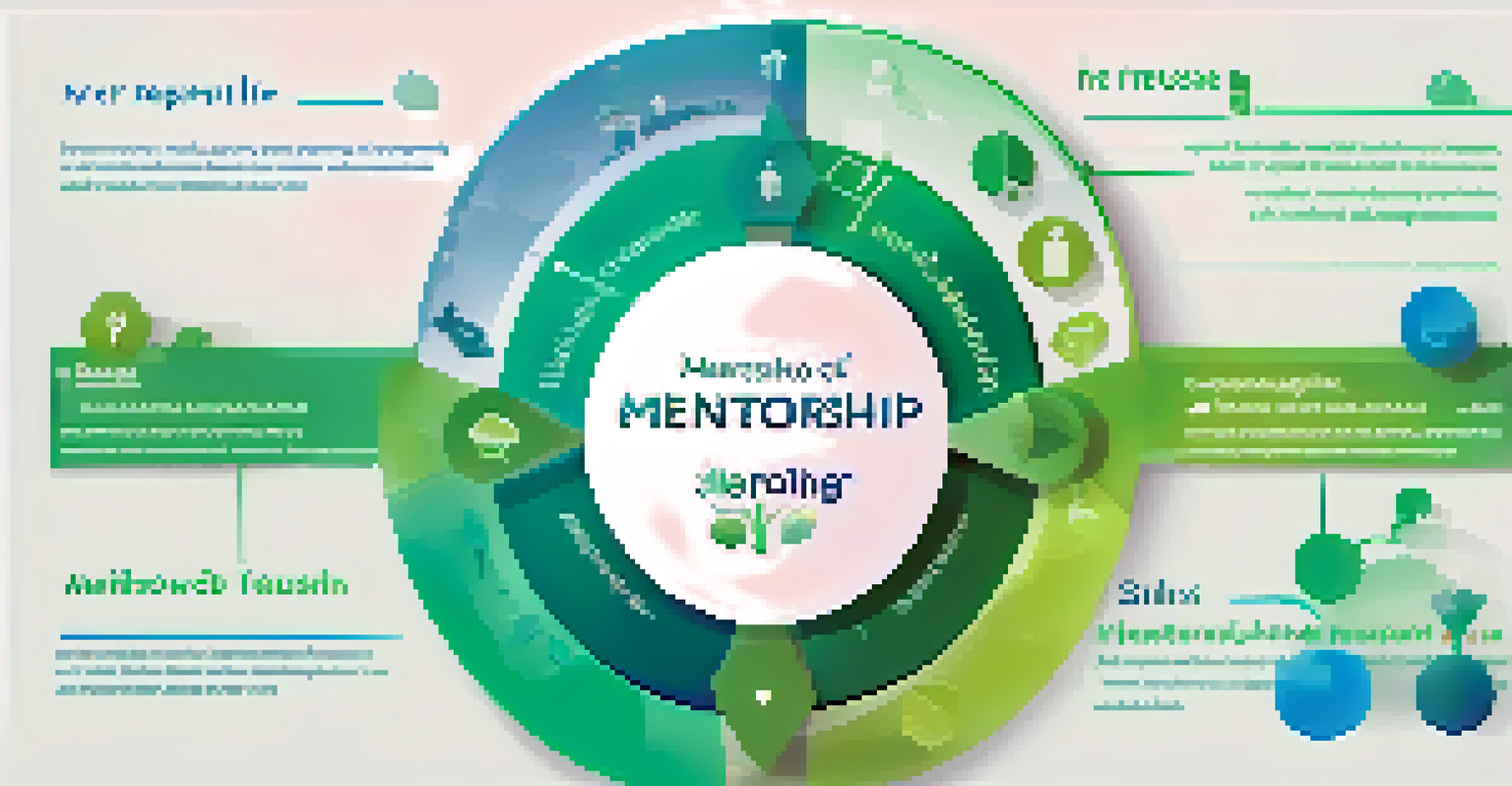The Role of Mentorship in Ongoing Professional Development

Understanding Mentorship and Its Importance
Mentorship is a relationship where an experienced individual guides a less experienced person. This dynamic can be incredibly valuable in fostering growth and knowledge sharing in professional settings. By learning from someone who has navigated similar paths, mentees can gain insights and avoid common pitfalls.
A mentor is someone who sees more talent and ability within you than you see in yourself, and helps bring it out.
The importance of mentorship extends beyond just skill development; it also nurtures confidence and resilience. Imagine having a trusted advisor who believes in your potential and encourages you to take bold steps. This support can be a game-changer, especially in competitive environments.
Moreover, mentorship can create a sense of belonging in the workplace. When professionals feel supported, they are more likely to engage and contribute actively, which ultimately benefits the organization as a whole.
Benefits of Mentorship for Mentees
For mentees, the benefits of mentorship are abundant. First, they gain access to a wealth of knowledge and experience that can accelerate their learning curve. This can be especially helpful when starting a new job or transitioning to a different industry.

Additionally, mentorship often leads to enhanced networking opportunities. A mentor can introduce their mentee to valuable contacts, opening doors that may have otherwise remained closed. These connections can lead to new career opportunities and collaborations.
Mentorship Boosts Professional Growth
Mentorship provides valuable guidance and resources, helping mentees accelerate their learning and navigate career challenges.
Lastly, mentorship fosters personal growth. Mentees learn not only about their professional field but also about themselves. They discover their strengths, weaknesses, and areas for improvement, helping them to carve out a clearer career path.
Benefits of Mentorship for Mentors
While the focus is often on the mentee, mentorship is equally rewarding for mentors. One key benefit is the chance to develop leadership and coaching skills. Guiding someone else requires patience and the ability to communicate effectively, which enhances one's own professional prowess.
Mentoring is a two-way street. It is not just about giving; it’s also about receiving.
Mentors also gain fresh perspectives from their mentees. As they share their experiences, mentors might discover new trends or ideas that they hadn't considered before. This exchange of knowledge can lead to innovative solutions in their own work.
Finally, there's a sense of fulfillment that comes from helping someone else succeed. Mentors often find joy in seeing their mentees grow and achieve their goals, creating a lasting impact on the next generation of professionals.
Creating a Successful Mentorship Relationship
Establishing a successful mentorship relationship requires clear communication and mutual respect. Both parties should set expectations from the outset, discussing goals and preferred communication styles. This clarity helps to build trust and ensures that the relationship is productive.
Regular check-ins are crucial for maintaining engagement. These meetings can provide a platform for discussing progress, challenges, and insights, allowing both mentor and mentee to stay aligned. It’s also a time to celebrate small victories, which can boost motivation.
Mutual Benefits for Mentors Too
Mentors develop leadership skills and gain fresh perspectives while finding fulfillment in supporting their mentees' success.
Lastly, it's important to remain open to feedback. Both mentors and mentees should be willing to share constructive criticism and praise. This openness fosters a growth mindset, encouraging continuous improvement on both sides.
Mentorship in the Digital Age
In today’s fast-paced, digital world, mentorship has evolved significantly. Online platforms and social media have made it easier than ever to connect with potential mentors, regardless of geographical barriers. This accessibility opens up diverse opportunities for professional development.
Virtual mentorship can also offer flexibility. With busy schedules, meeting in person can be challenging, but online interactions can fit more seamlessly into daily routines. Whether through video calls, emails, or messaging apps, mentoring relationships can thrive in a digital environment.
However, it’s essential to maintain the personal touch in virtual mentoring. Building rapport and trust online may require more effort, so being intentional about communication is key. Sharing personal anecdotes and being genuinely interested in each other’s journeys can help bridge the virtual gap.
The Role of Organizations in Fostering Mentorship
Organizations play a crucial role in promoting mentorship within their cultures. By establishing structured mentorship programs, companies can facilitate connections between experienced employees and those seeking guidance. This structured approach can lead to more meaningful and productive relationships.
Additionally, organizations should encourage a culture of knowledge sharing. When employees feel valued and empowered to mentor others, it creates a collaborative environment. This not only enhances professional development but also boosts employee morale and retention.
Organizations Foster Mentorship Culture
Structured mentorship programs within organizations enhance employee engagement, morale, and overall professional development.
Investing in mentorship programs can yield long-term benefits for organizations, from improved employee performance to enhanced innovation. By nurturing a culture of mentorship, companies can ensure that their workforce remains engaged, skilled, and ready to tackle future challenges.
Measuring the Impact of Mentorship
Measuring the impact of mentorship can be challenging, but it is essential for understanding its value. One effective approach is to gather feedback from both mentors and mentees regarding their experiences and outcomes. Surveys and interviews can reveal insights into how mentorship has influenced career growth and satisfaction.
Another way to measure impact is through tracking career progression. Organizations can analyze data on promotions, salary increases, and job satisfaction among those who have participated in mentorship programs compared to those who haven’t. This data can provide compelling evidence of mentorship's effectiveness.

Finally, it's important to recognize that mentorship is not a one-size-fits-all solution. The impact may vary based on individual goals, industries, and personal circumstances. By considering various metrics and perspectives, organizations can better understand and enhance their mentorship initiatives.